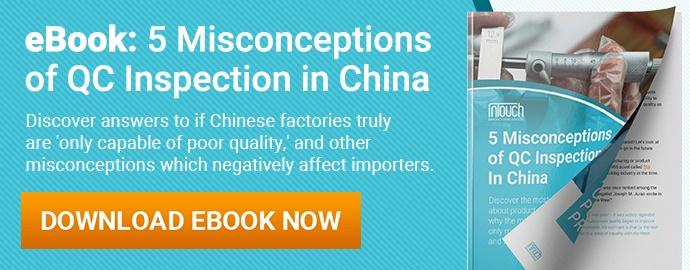 Have you ever thought your Chinese supplier understood your requirements perfectly, only to receive products that didn’t even meet your specifications? Or did you think your supplier was on track to meet a deadline, only to discover just a few days before shipment that it would be delayed for a week?
Have you ever thought your Chinese supplier understood your requirements perfectly, only to receive products that didn’t even meet your specifications? Or did you think your supplier was on track to meet a deadline, only to discover just a few days before shipment that it would be delayed for a week?
There could be a lot of causes for these scenarios. But there are some common threads in many importers’ difficulties with Chinese suppliers that can be traced back to cultural differences between China and their home country. While many Chinese factories have years of experience working with foreign buyers, you should still recognize how cultural backgrounds might affect their working processes and communication.
A lot of misconceptions persist about Chinese factories and China quality control processes (related: 5 Misconceptions of QC Inspection in China [eBook]). Understanding cultural differences with Chinese suppliers can help you prevent unnecessary conflicts, misunderstandings and delays with your supplier, and even improve your product quality.
1. Culture of "yes" and how it impacts your products
One of the most common questions importers ask their supplier is this: “Can you meet our requested ship date?” Often a Chinese supplier will reply with a simple “yes”, even when they know they probably can’t meet the deadline. And then they’ll wait until closer to the shipment date to notify their customer of a delay (related: 3 Reasons Your Supplier Might Be Sending You the Wrong Message).
Why wouldn’t they just tell the customer “no” upfront?
One possible reason you might be the customer in this scenario—and certainly a reason not limited to suppliers in China—is that the supplier agreed to your requirements so they could win your business. But a more cultural explanation for this response in China is that Chinese suppliers tend to favor a harmonious relationship with their customers and will sometimes withhold any information that could cause a conflict.
 Many suppliers think bad news will disappoint the importer and hinder their relationship. So they only tell their customer what they think they want to hear. Your supplier might think they don’t need to tell you about a certain problem if they think they can solve it without your involvement. Some will think if they wait until they find a solution to tell you, you’re more likely to perceive this as “good news”.
Many suppliers think bad news will disappoint the importer and hinder their relationship. So they only tell their customer what they think they want to hear. Your supplier might think they don’t need to tell you about a certain problem if they think they can solve it without your involvement. Some will think if they wait until they find a solution to tell you, you’re more likely to perceive this as “good news”.
If your supplier waits until the very end of production to tell you about a delay, it’s likely already too late for you to do anything about it. You may be at the mercy of the situation at that point and forced to rely on your supplier to resolve a delay you could’ve avoided or mitigated had you known sooner.
How to encourage direct communication with your Chinese supplier
As an importer, one of your top priorities should be maintaining clear communication with your suppliers. Although you’ll probably be speaking with your supplier in English, cultural language patterns can still create misunderstandings that lead to production or quality issues.
China is considered a “high context” culture, where indirect and implicit messages are common and some meanings might be left unsaid. In contrast, most Western cultures are considered “low context” cultures, where direct and simple messages are more commonly used to impart a clear meaning. Unfortunately, this conflicts with many importers’ priorities to receive information directly and as quickly as possible to plan for unexpected issues and delays.
Some practices that can help improve your communication and avoid problems with your product quality in China are:
- Telling your supplier directly that you’d like them to keep you informed on any status updates regarding your order, even, and especially, bad news.
- Regularly contacting your supplier to check in and ensure your production timeline is on track. Some importers may follow up with their supplier weekly, biweekly or come up with a customized follow up plan based on their individual circumstances.
- Using multiple communication tools to stay in touch, like email, phone and instant messaging apps like WeChat and Skype.
 Using WeChat is an especially reliable way to get quicker responses from your supplier. Almost 25 percent of WeChat users spend more than four hours a day on WeChat and 83 percent use WeChat for work. You can even make free voice calls through WeChat, which can be helpful to follow up on important written communications or to have a longer conversation.
Using WeChat is an especially reliable way to get quicker responses from your supplier. Almost 25 percent of WeChat users spend more than four hours a day on WeChat and 83 percent use WeChat for work. You can even make free voice calls through WeChat, which can be helpful to follow up on important written communications or to have a longer conversation.
Remember to never assume your supplier understands your requirements or knows how you want them to communicate. Even if they have a number of customers that share your culture, it’s often hard to change one’s own cultural habits to match another individual’s.
2. Saving "face" while neglecting your product quality
It’s common in the West to end emails or requests with phrases like “let me know if you have any questions or concerns” or “let me know if you need any clarification on the above”. If you send this to your Chinese supplier, you may just get a short reply like: “Thank you, no questions”. And maybe that simple response is all you need to feel confident in your supplier’s understanding of your message.
But when you receive the finished goods you could find serious quality issues you could’ve avoided had your supplier clearly understood your earlier message. Instead, your supplier moved forward with manufacturing and shipping your goods while unanswered questions loomed.
 Why didn’t they ask for clarification?
Why didn’t they ask for clarification?
This hesitance to ask questions can be traced to a cultural practice known as “saving face”. “Face” (or 面子; miàn zi in Mandarin) represents self-respect, self-esteem or dignity in Chinese culture. People think highly of their face, so they don’t want to “lose face” by admitting to others when they don’t know something. To save face is to act in a manner that upholds your dignity, prestige and good reputation.
If you ever visit a school in China, you might be surprised to find that most students remain silent and don’t ask questions during the lesson. If you do ask a question, the teacher will often say, “Haven’t you been listening to what I was teaching just now?” or even scold the student for not understanding a simple topic right away. In order to save face, the students would rather choose to not ask questions to avoid appearing ignorant.
This reluctance to ask questions often extends from the classroom to the factory where clarity is essential for product quality. So how can you ensure suppliers understand your requirements?
How to ensure your Chinese supplier understands your requirements
If you’re not already in the habit of encouraging your Chinese suppliers to ask questions, now would be a great time to start. Some actions you can start taking to help prevent any miscommunication are:
- Clarify your expectations early to allow plenty of time for discussion and questions before production begins, rather than right before your shipment deadline.
- Ask your supplier to relay back their understanding of different points discussed. This helps you know what your supplier may be unsure about without forcing them to ask questions directly.
- Keep your emails short and simple to provide an opportunity for your supplier to ask questions on each topic one-by-one as necessary. If you send a lengthy email describing multiple checkpoints within it, your supplier is more likely to overlook information.
- Provide your product specifications and quality control inspection requirements in a QC checklist, or in another central document. If the document is ever revised later, be sure your supplier is working off the same, current version you have.
- Perform quality control inspection at key production stages to check that your supplier understands requirements and that these requirements are reflected in the product.
As the saying goes, “an ounce of prevention is worth a pound of cure”. It’s easier to prevent a misunderstanding than to try to fix a defective product after the fact. But performing quality control inspection can help you catch any issues before they reach your customers. It can also help open a discussion with your supplier about what issues you regard as unacceptable and help prevent similar issues in the future.
3. “Wining and dining” and China quality control
If you’ve ever paid a visit to your suppliers, chances are they’ve probably invited you to some sort of entertainment, dinner or drinks at their expense. You might also be in the habit of treating your own important customers and colleagues in this manner. But in China, it’s often much more elaborate, direct and common. Inviting you to dinner is another way for your supplier to save face, as they could be considered a bad host if they don’t take a visiting guest out for fun.
Is wining and dining an inherently bad practice?
Not at all. Visiting your supplier and socializing with them can help improve your relationship and communication. Visiting your supplier and spending time with them can really help make you more than just a faceless name on one in a stack of many purchase orders.
 But this common cultural practice can inhibit your China quality control efforts if it’s allowed to spread to supplier staff trying to influence inspectors with meals, favors, gifts or outright bribes. By showing their generosity, the supplier could build a close relationship with your inspector. And soon this relationship could begin to erode the inspector’s judgement, and in turn, inhibit reporting and your ability to address any problems with your product.
But this common cultural practice can inhibit your China quality control efforts if it’s allowed to spread to supplier staff trying to influence inspectors with meals, favors, gifts or outright bribes. By showing their generosity, the supplier could build a close relationship with your inspector. And soon this relationship could begin to erode the inspector’s judgement, and in turn, inhibit reporting and your ability to address any problems with your product.
How to prevent corruption issues from affecting your China quality control
Inspectors often share a cultural connection with factory staff and owners because they’re typically native speakers of the same language and residents of the same area. It might be easier for them to fall prey to these cultural practices and fail to recognize an integrity issue before it’s too late.
Rotating inspectors is one of the best ways to prevent your supplier from “wining and dining” them and avoid a relationship developing between an inspector and factory staff. Rotating inspectors randomly with no set order or pattern ensures factory staff can’t plan ahead or expect a certain person for each inspection. You can also send multiple inspectors together so that no individual inspector is vulnerable.
Whoever you’re sending to the factory to check your products, it can help to have a Code of Ethics with policies regarding bribery to prevent and solve such problems if they arise. Some third-party QC providers will also require factory staff to sign off on inspection reports and a Factory Integrity Declaration Form to prevent pushback or unethical behavior from either factory or inspection staff (related: How InTouch Prevents Corruption Issues from Hijacking Your Product QC).
Conclusion
A close relationship with your supplier can be invaluable when it comes to successfully importing from China and improving China quality control. Taking just a little extra time to understand the environment of your manufacturing area can help you avoid mistakes that many importers make in China and even improve your product quality.
Of course, all of the cultural practices discussed here are relative and don’t perfectly represent every person in every culture. And your supplier should still act in a professional manner, regardless of their cultural background. There are many reputable and capable suppliers in China. But if you find yourself working with one that is deliberately dishonest, it just might be time to find new one.
What other cultural habits of your Chinese supplier have you found mystifying? Let us know in the comments section below!







